European leaders called for Turkey to revoke blanket ban on LGBT events
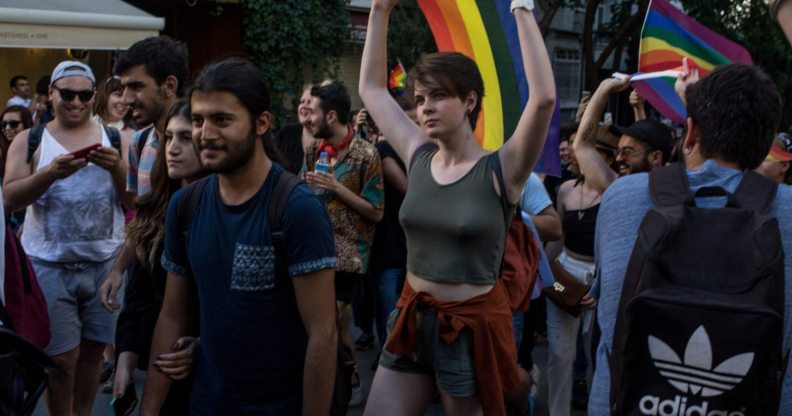
(Photo by Chris McGrath/Getty Images)
Members of the European Parliament (MEPs) have called for Turkey to revoke a blanket ban on LGBT events.
The Turkish capital city Ankara last weekend banned all LGBT events, citing “public sensitivity”.
The move came a few days after a German gay film festival was banned from taking place in the city.
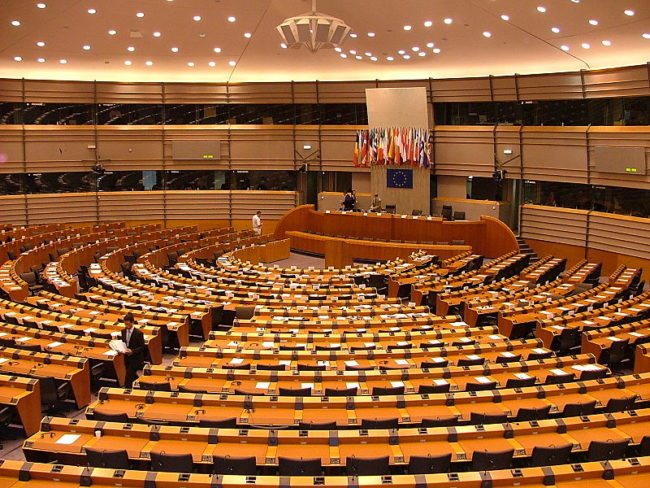
(Photo: Alina Zienowicz)
Any exhibitions, public performances, cultural events and cinema relating to LGBT people, have been banned by the Governor’s office.
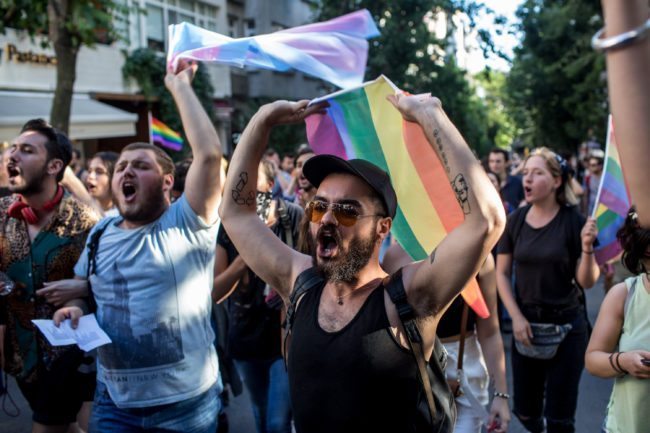
Instanbul Pride march (Getty)
The Council of Europe Commissioner Nils Muizniek has already criticised the move.
And now a letter has been issued, signed by 20 MEPs, calling on Turkey to roll-back the ban.
It reads: “We are deeply disturbed by the statement by the Ankara Governor’s Office of 19 November regarding the decision to ban indefinitely any event organised by LGBTI organisations, such as the projection of films, staging of theatre plays, panels, discussions and exhibitions, citing “social sensitivities and sensibilities”, “public security”, “protection of public health and morality” and “protection of others’ rights and liberties” as grounds for the ban.
“As Members of the European Parliament, we call on Turkish authorities to immediately revoke this ban and restore the right to freedom of assembly as guaranteed in the Turkish constitution.”
Continuing: “This suppression of the freedom of assembly for LGBTI people and their allies, is completely unacceptable and is a blatant violation of international law, to which Turkey is bound. This right was upheld several times by the European Court of Human Rights (notably in Bączkowski and others v. Poland (2007) and Alexeyev v. Russia (2010)). Further the International Covenant on Civil and Political Rights protects sexual orientation from discriminatory laws and practices under its Articles 2 and 26, including when it comes to freedom of expression and assembly (Art. 19 and 21).
“The ban is the latest in a series of crackdowns on the LGBTI community and those who speak out in favour of their rights, and the consequences are felt beyond Ankara, as LGBTI events in other cities have been banned too. In Bursa the screening of the film “Gaci Gibi” was banned; in Istanbul the screening of “Queer Shorts” was banned by the District Governorship of Beyoğlu; also the German LGBTI Film Days Festival in Ankara was banned prior to the statement.”
Concluding: “Furthermore, we are worried that the ban increased hate speech against the LGBTI community. Following an attack in the media, a workshop on “Gender Based Journalism” in Mardin, which was planned for November 18, had to be cancelled.
“In light of the above we urge Turkish authorities first and foremost to revoke this ban and work to ensure full respect for the right to peaceful assembly of all, including LGBTI people, in line with international law and the Turkish constitution.”
The Governor’s office in Ankara last month banned a festival which was set to take place that weekend.
“Starting from Nov. 18, 2017, concerning our community’s public sensitivity, any events such as [LGBT] cinema, theatre, panels, interviews, exhibitions are banned until further notice in our province to provide peace and security,” a statement released on Sunday read.
The festival would have seen four films by German directors over 16-17 November.
The Governor’s office cited fears of terrorism and public safety concerns.
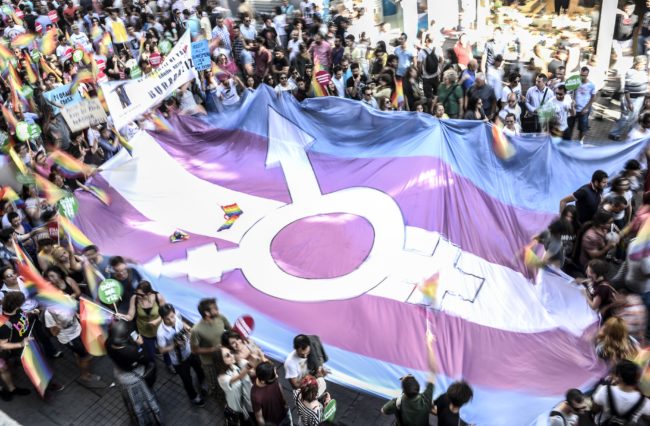
Trans flag
“Considering that the content could incite grudges and enmity toward a part of society… and the intelligence reports that terror organizations are seeking to attack dissentient groups or individuals, it is evaluated that this film screening could be provocative and draw reactions,” said the Ankara governor’s office in a statement.
Earlier this year, a Pride event was cancelled for the second consecutive year, and when demonstrators took to the streets anyway, several were detained by authorities.
Seven transgender activists were detained in Istanbul after they staged a trans Pride event despite authorities banning it.
The Istanbul’s governor office banned the Pride event to “preserve public order and keep tourists and participants safe”.
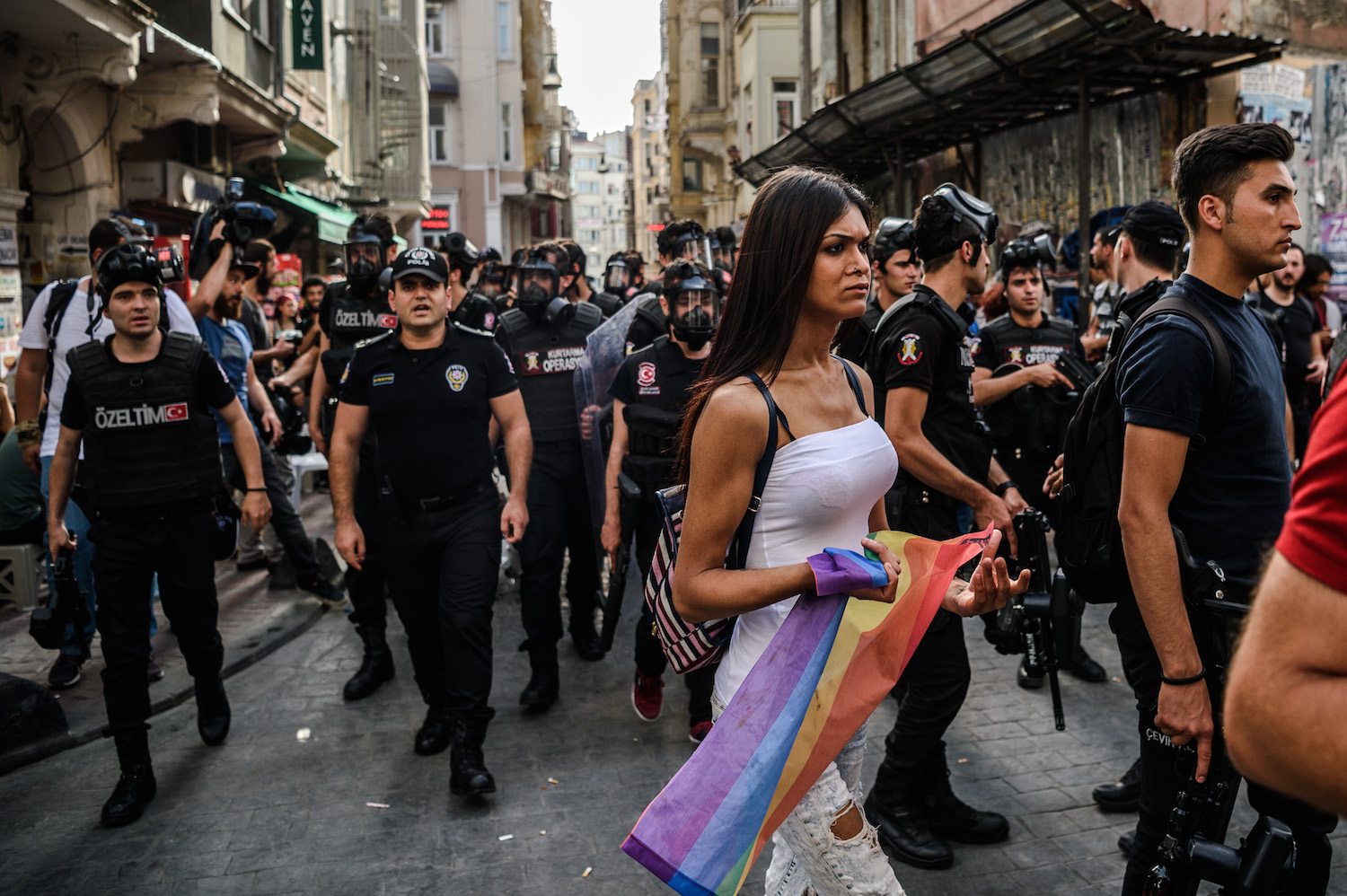
Police fired rubber bullets and tear gas at Pride marchers who rallied at the cancelled event in 2015
It came after a separate Pride event was cancelled and resulted in Turkish police using rubber bullets and tear gas on rallies.
It’s believed that ultranationalist groups threatened the trans march, which the governors office described as “very serious reactions”.
Istanbul LGBTI, who organised the 8th annual Trans Pride March, said that they would not recognise the ban that was imposed.
“We are trans, we are here, get used to it, we are not leaving,” they said in a statement on Facebook.
They also announced on social media that they intended to meet at Taksim Square for the event.
A water cannon was sent to the area but it was not used on activists.
And earlier this year rubber bullets were fired at a group of an estimated 40 people who rallied for the LGBT Pride march.
It was the second year in a row that authorities cancelled the event, but activists still attempted to attend.
It is believed that a number of lawyers working in conjunction with the organisers of the march were temporarily detained.
Pride rallies have been organised for the last 13 years in Istanbul.
The last successful march was held in 2014 with an estimated 100,000 people turning out for one of the largest LGBT celebrations in a Muslim majority country.
In 2015 the march was cancelled citing a “flagrant violation of the constitution and the law” but a number of marchers defied authorities and gathered anyway. However, they were dispersed by police using tear gas and rubber bullets.
2016’s Pride event was also cancelled, citing a Government ban and security concerns.
They claimed that the concerns stemmed from the Orlando massacre which left 49 people dead.
Defiant activists once again took to the streets but over 300 riot officers and a water cannon were deployed to break up the event.

